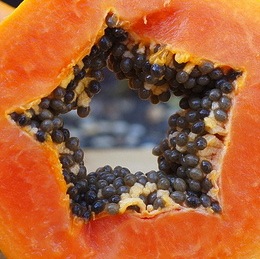October 9, 2013 — Heavy metals released by industries such as gold mining and battery manufacturing can make water unfit for human consumption. Developed countries have technologies for removing such pollutants from drinking water, but in developing countries the cost of conventional water purification systems is often too high to make them practical.
Now, researchers from Redeemer’s University in Nigeria and the University of Pottsdam in Germany have hit upon a possible economical alternative: papaya seeds mixed with clay. Combining Nigerian kaolinite clay with papaya seeds obtained from local markets and dried in the sun, the scientists were able to produce a “hybrid clay” that successfully filtered lead, cadmium and nickel from contaminated water. Noting that it is easy to make, employs readily accessible materials, and can be used over and over, the team called the new adsorbent “a highly efficient alternative to activated carbon for water treatment.” Photo by Tatters:) (Flickr | Creative Commons)
Ensia shares solutions-focused stories free of charge through our online magazine and partner media. That means audiences around the world have ready access to stories that can — and do — help them shape a better future. If you value our work, please show your support today.
Yes, I'll support Ensia!
